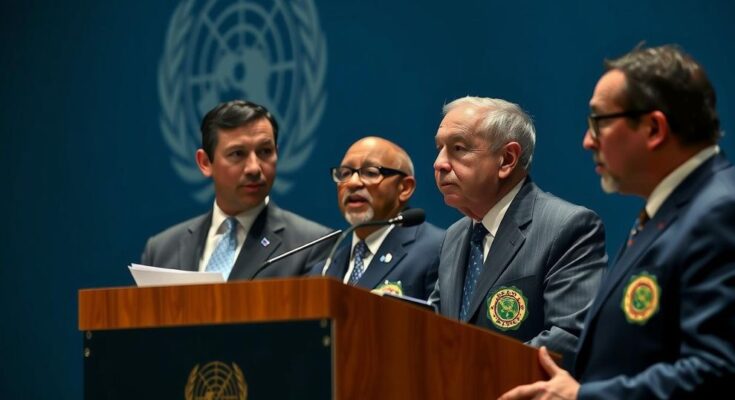The COP29 summit ended with a controversial climate deal wherein developing nations deemed the US$300 billion annual pledge by wealthier countries insufficient. Negotiations were tense, leading to widespread criticism from nations like India and Nigeria, who called the financial agreement insulting. While the deal is viewed as a starting point, it highlights ongoing challenges in achieving equitable climate financing amidst dire environmental threats.
At the conclusion of the COP29 summit in Azerbaijan, a climate deal was forged, yet poorer nations swiftly condemned the US$300 billion annual pledge by 2035 from wealthy nations as grossly inadequate.
The negotiations, characterized by significant contention, saw nearly 200 countries reach an agreement in a local sports arena during the final hours of the summit. However, India’s representative, Chandni Raina, described the financial commitment as “paltry,” asserting that it failed to address the immense challenges faced by developing nations severely affected by climate change.
Sierra Leone’s Minister of Environment, Jiwoh Abdulai, echoed these sentiments, stating it illustrated a lack of commitment from affluent countries to support the world’s most vulnerable populations facing critical climate threats. Nigeria’s envoy, Nkiruka Maduekwe, further declared, “This is an insult” to those advocating for substantial aid.
Despite hopes for a more significant financial package, developing nations received only a fraction of what they anticipated, with Tina Stege from the Marshall Islands expressing that although the outcome was disappointing, it marked a small starting point for future negotiations. UN Secretary-General Antonio Guterres also expressed that he had anticipated a more substantial result, emphasizing the dire circumstances regarding global temperature increases, nearing the critical 1.5°C threshold, essential to mitigating severe climate impacts.
Nations grappled at COP29 with persistent divides surrounding financial responsibilities of developed nations versus those of developing nations, ultimately resulting in a compromise that fell short of the US$390 billion figure deemed necessary by economists. UN Framework Convention on Climate Change Executive Secretary, Simon Stiell, summarized the deal as imperfect, reminding, “No country got everything they wanted,” cautioning against premature celebrations in light of ongoing climate challenges.
The Conference of Parties (COP) 29 marked a significant dialogue among nearly 200 nations regarding the global climate crisis, focusing particularly on the financial commitments of developed countries to developing nations most vulnerable to climate changes. This summit serves as an ongoing effort to address historic inequities in climate contributions, as wealthier nations are often responsible for the majority of carbon emissions but have historically contributed less to mitigating the effects of climate change in poorer countries. The discussions reflect longstanding tensions regarding financial support and accountability in addressing climate emergencies.
In summation, the COP29 concluded with a financial commitment from wealthy nations that has been deemed inadequate by developing countries, who stress the critical need for substantial support in confronting climate adversity. The mixed reactions highlight a continued struggle between affluent and developing nations regarding climate financing, emphasizing the larger necessity for a collaborative global approach to clashing ecological and humanitarian crises. The inadequate deal underscores the urgency of rectifying historical climate injustices to protect vulnerable populations across the globe.
Original Source: www.taipeitimes.com




